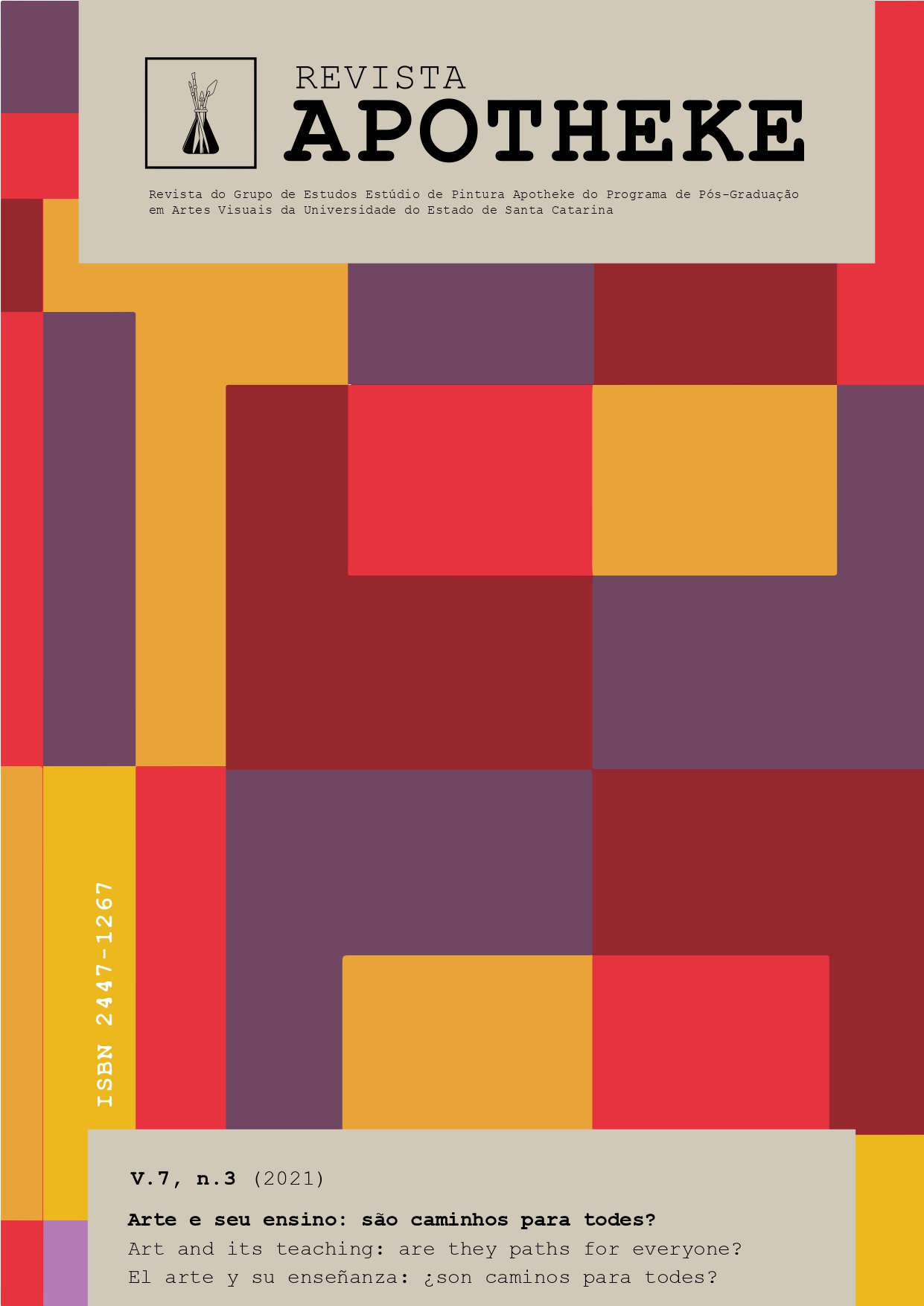Problematizing gender-based discrimination and violence via art
DOI:
https://doi.org/10.5965/24471267732021069Keywords:
Art, Education, Gender, Discrimination, ViolenceAbstract
Women are victims of numerous forms of discrimination and violence in our society. Therefore, it is imperative to develop strategies to sensitize society about these problems, which can contribute to the transformation of mentality necessary to effectively face them. Based on the problematization of art and its history, we have outlined and carried out educational actions with the following objectives: to stimulate a reflexive and critical attitude about gender relations and to encourage the opposition and the fight against discrimination and violence against women. These actions were conceived in order to elucidate, from the discussion about works, artists and the art system, that gender prejudices, asymmetries and violence have been trivialized and reinforced, but also exposed and fought through art over the course of history. The statements of the participants of these actions show that the proposed problematizations have aroused new ways of seeing, fostering important reflections and discussions about the stereotyping, exclusion and violence suffered by women, inside and outside the field of art.
Downloads
References
ANUÁRIO BRASILEIRO DE SEGURANÇA PÚBLICA. São Paulo: Fórum Brasileiro de Segurança Pública, v. 14, 2020. ISSN 1983-7364 versão online. Disponível em: https://forumseguranca.org.br/anuario-brasileiro-seguranca-publica/. Acesso em: 19 nov. 2020.
BRASIL. Decreto nº 89.460, de 20 de março de 1984. Promulga a Convenção sobre a Eliminação de Todas as Formas de Discriminação contra a Mulher, 1979. Diário Oficial da União: seção 1, Brasília, DF, ano 122, n. 56, p. 4018-4023, 21 mar. 1984.
BRASIL. Decreto nº 1.973, de 1 de agosto de 1996. Promulga a Convenção Interamericana para Prevenir, Punir e Erradicar a Violência contra a Mulher, concluída em Belém do Pará, em 9 de junho de 1994. Diário Oficial da União: seção 1, Brasília, DF, ano 134, n. 149, p. 14471-14472, 2 ago. 1996.
BRASIL. Decreto nº 4.377, de 13 de setembro de 2002. Promulga a Convenção sobre a Eliminação de Todas as Formas de Discriminação contra a Mulher, de 1979, e revoga o Decreto nº 89.460, de 20 de março de 1984. Diário Oficial da União: seção 1, Brasília, DF, ano 139, n. 179, p. 4, 16 set. 2002.
BRASIL. Lei nº 11.340, de 7 de agosto de 2006. Cria mecanismos para coibir a violência doméstica e familiar contra a mulher, nos termos do § 8º do art. 226 da Constituição Federal, da Convenção sobre a Eliminação de Todas as Formas de Discriminação contra as Mulheres e da Convenção Interamericana para Prevenir, Punir e Erradicar a Violência contra a Mulher; dispõe sobre a criação dos Juizados de Violência Doméstica e Familiar contra a Mulher; altera o Código de Processo Penal, o Código Penal e a Lei de Execução Penal; e dá outras providências. Diário Oficial da União: seção 1, Brasília, DF, ano 143, n. 151, p. 1-4, 8 ago. 2006.
BUENO, Samira; BOHNENBERGER, Marina; SOBRAL, Isabela. A violência contra meninas e mulheres no ano pandêmico. In: ANUÁRIO BRASILEIRO DE SEGURANÇA PÚBLICA. São Paulo: Fórum Brasileiro de Segurança Pública, v. 15, 2021. p. 93-109.
SANTOS JUNIOR, Jocy Meneses dos. Discutindo questões de gênero em contextos educativos a partir da arte: estereótipos, violências e resistências. 2021. Trabalho de Conclusão de Curso (Especialização em Arte, Mídia e Educação) – Instituto Federal de Educação, Ciência e Tecnologia do Maranhão, São Luís, 2021b.
Downloads
Published
How to Cite
Issue
Section
License
Copyright (c) 2022 Jocy Meneses dos Santos Junior, Jarlisse Nina Beserra da Silva

This work is licensed under a Creative Commons Attribution-NonCommercial 4.0 International License.
Copyright and Licensing Policy
Authors of works submitted to Revista APOTHEKE authorize their publication in both print and digital formats exclusively for academic purposes. Reproduction is permitted, provided that the source is properly cited. Authors confirm the originality, authorship, and unpublished status of their manuscripts.
Articles published by the journal are freely available and intended for academic and non-commercial use only. All copyrights are transferred to the journal. The content of signed articles reflects the views of their respective authors and not the official position of Revista Apotheke. The author(s) agree to always cite the following reference when republishing or referring to the content originally published in Revista Apotheke:
“This article was originally published by Revista Apotheke in volume (insert volume), number (insert number), year (insert year), and is available at: http://www.revistas.udesc.br/index.php/APOTHEKE/index”
It is the sole responsibility of the authors to obtain written permission for the use of any material protected by copyright law included in their articles. Revista Apotheke is not responsible for copyright infringements committed by contributors.
Authors retain copyright and grant the journal the right of first publication, with the work licensed under a Creative Commons Attribution-NonCommercial License (CC BY-NC):
-
Attribution (BY): Licensees are allowed to copy, distribute, display, perform, and create derivative works, provided that proper credit is given to the author or licensor, in the manner specified.
-
NonCommercial (NC): Licensees may use the material only for non-commercial purposes.
After publication, authors retain the rights to their work and may republish the text.



